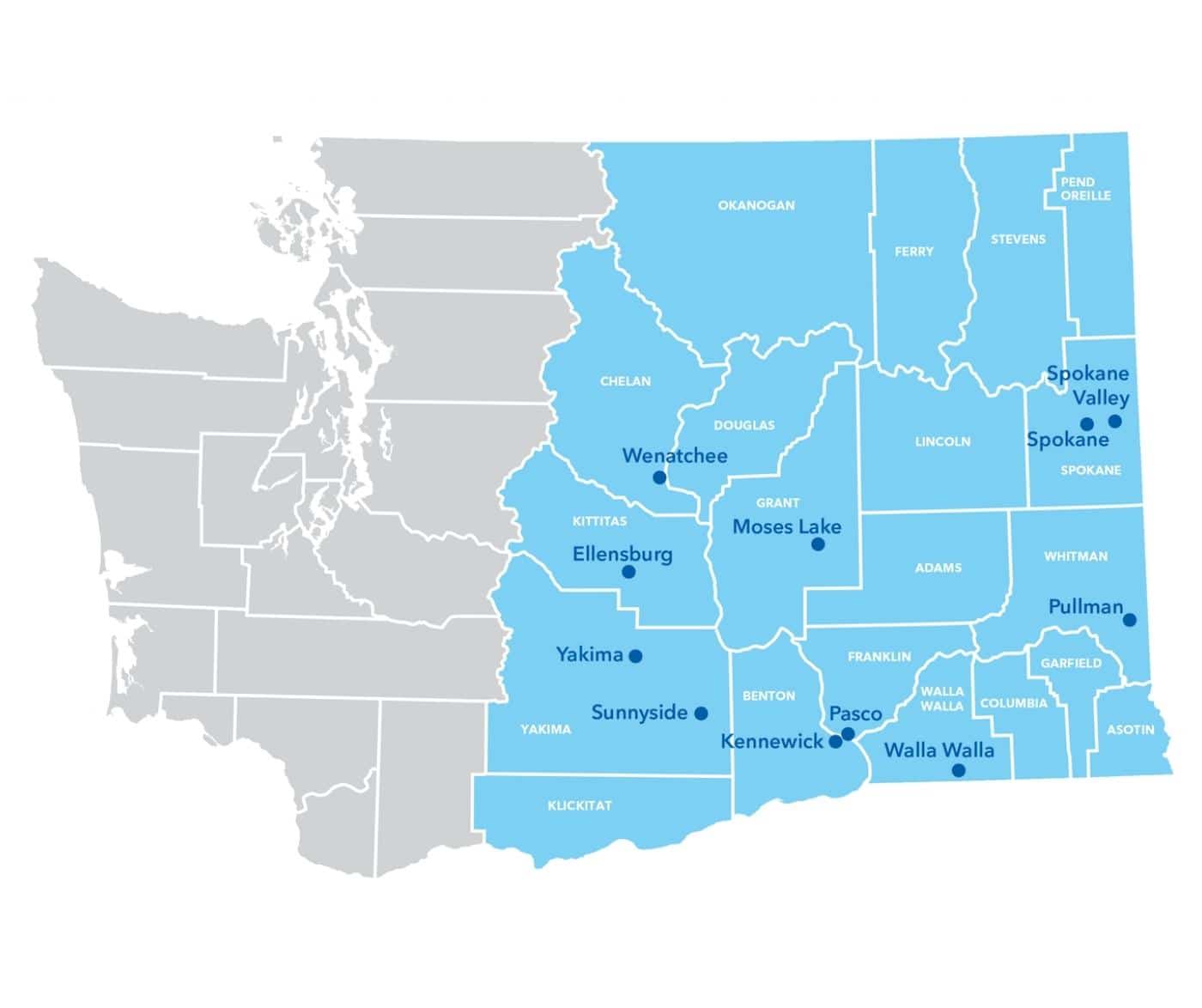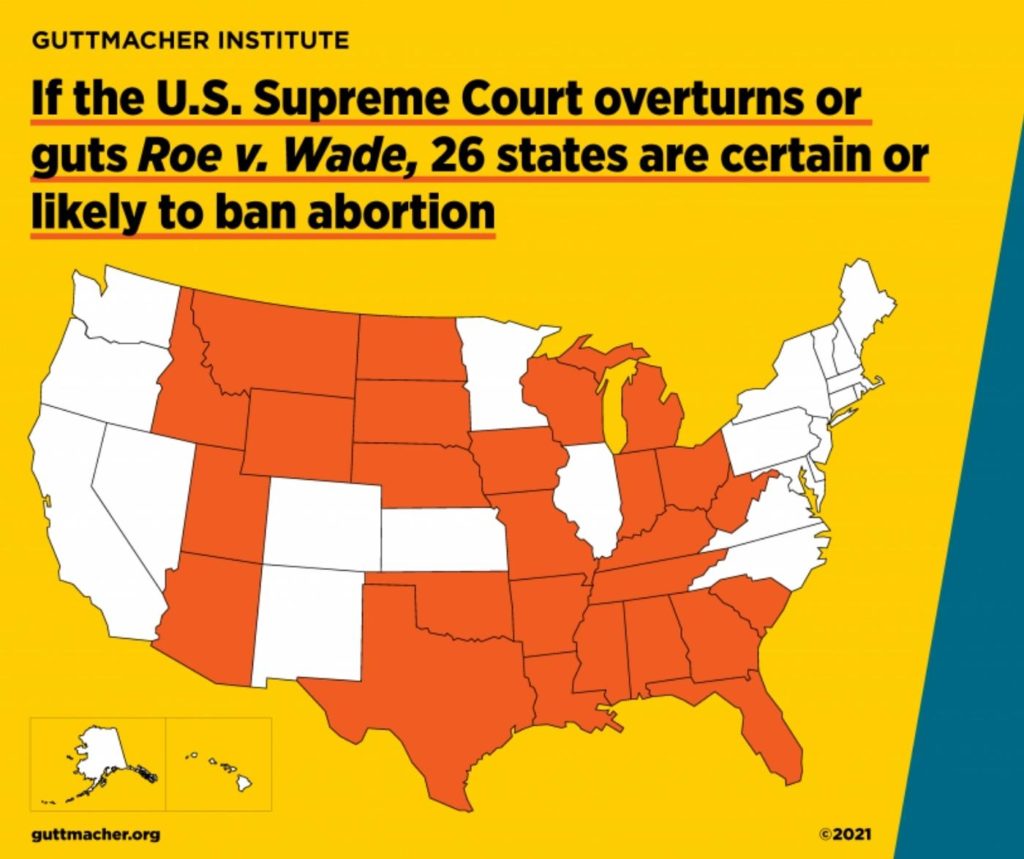Reproductive, racial, and economic justice are all deeply interconnected. A person’s decision to choose whether to give birth has lifelong impact on the economic security of both the parent and child. With the uncertainty around the future of Roe v. Wade at the federal level, we asked our friend Sarah Dixit of Planned Parenthood of Greater Washington and North Idaho to share what the impact will look like at the local level and what we can do to maintain and expand reproductive justice here in Washington state.
Click image to enlarge.
It has been a month since Justice Alito’s draft majority opinion on Dobbs v. Jackson Women’s Health Organization was leaked, which confirmed the increasing likelihood that the 1973 decision in Roe v. Wade will not see its 50th anniversary. Before that and since then, states have moved bans forward with cruel additions, like “sue thy neighbor” enforcement and criminal penalties for doctors, and most recently, Oklahoma passed the nation’s strictest abortion ban in the nation, effectively ending availability of the procedure within the state. The Guttmacher Institute estimates that 26 states are certain or likely to ban abortion if the U.S. Supreme Court weakens or overturns Roe v. Wade, so what does this mean for our communities, and why should we all care?
No one’s health, safety, or futures should be dependent upon their identity or zip code.
Access to reproductive justice isn’t balanced
First and foremost, limiting or outlawing abortion access will not impact every person to the same degree. There are many aspects of someone’s identity that determine their ability to access abortion care, most of which can be tied to their socioeconomic status and their racial identity.
Wealthy, white, cis-women will still be able to access abortion care regardless of where they live, due to the fact that they can travel out of state with relative ease. Whereas folks of color living paycheck to paycheck, often with children already at home in their care, will not have the time, money, or ability to travel hundreds, if not thousands of miles for abortion care.
We’ve already seen the impact that abortion bans have on communities. Looking at Texas after S.B. 8, between Sept. 1 and Dec. 31, Planned Parenthood health centers in neighboring states saw a nearly 800% increase in abortion patients, and some of those states have moved to ban abortion themselves, increasing the distance that patients will have to travel. No one’s health, safety, or futures should be dependent upon their identity or zip code.
The implications of reproductive justice on other rights
Secondly, it’s important to note that these bans and the draft SCOTUS opinion have implications beyond abortion rights. If we look at the reasoning Justice Alito used, it could be applied to many civil rights that people currently and actively rely on for equal protection under the law. He writes, “The inescapable conclusion is that a right to abortion is not deeply rooted in the Nation’s history and traditions,” – well, neither was the right to vote for folks who weren’t white men.
This is the first time that the Court would go against precedent to roll-back rights. Historically, when the Justices rule against established laws, it is in an effort to expand and progress forward, but this would not be true for Roe. This trend of conservative interpretations of the law and the Constitution strikes fear in a lot of different communities, and folks have been wondering, “What will they come after next?” Will it be marriage equality? Access to birth control? Voting?
Attack on reproductive justice by far-right extremism
I would be remiss if I did not explicitly call out the connection that anti-abortion movements have with other forms of extremism, both domestically and internationally. Long story short, there is this phenomenon known as “abortion exceptionalism,” where people give an exception to the anti-abortion movement because they’re seen as harmless activists who are driven by religion and this single issue.
I’m sure many of you even, when someone says they’re anti-abortion, you shrug and might not agree, but ultimately don’t feel quite as upset. This provides a lot of leniency to anti-abortion activists, and it’s in the dismissal of their extremist rhetoric where a lot of other movements gain a foothold. A big example of this is how many prominent anti-abortion activists participated in the January 6th Capitol Riots, and who show up regularly at City Council meetings, School Board meetings, and other spaces of our democracy to shut them down.
And even now, the draft opinion – showing where the United States stands on this issue – is emboldening anti-rights movements. We have to be aware of this connection to make sure we are outspoken about it, and to ensure people know this is more than just abortion – it’s our democracy.
Protection of reproductive rights not guaranteed
Now, if you’ve gotten this far in the blog post, and you’re thinking to yourself, “Wow, this really sucks, but at least we live in Washington State,” I’d be careful.
There are so many communities in this area with patients who still have to travel to receive the care that they need, which is something we in Washington State need to address.
Yes, Washington is a progressive state, where voters codified Roe in 1970 (before the Supreme Court decision), and voted in 1991 to further protect and expand access, but all it takes is losing some key races for some of that access to be rolled back. Furthermore, a right cannot be a right without equal access, and that is something Washington struggles with. In the Central and Eastern Washington region of our Planned Parenthood affiliate, we are the only major abortion provider:
Click image to enlarge.

Planned Parenthood Greater Washington and North Idaho works for reproduce justice in these clinics east of the Cascades.
Expanding access to reproductive justice in Washington state
As you can tell, there are so many communities in this area with patients who still have to travel to receive the care that they need, which is something we in Washington State need to address. It is also being estimated that if Roe falls, clinics in Washington will see a 385% patient increase from other states, which will cause a delay in care for patients and increased burnout in providers.
So, what do we need to work on? This past legislative session we were able to increase access through the Affirm Washington Abortion Access Act, which expanded the guidelines on who can perform abortions to include Physician Assistants and Advanced Registered Nurse Practitioners, updated abortion statutes to be gender-inclusive, and it reinforced our statutes to make sure no one is criminalized for their pregnancy decisions or for supporting others in exercising their reproductive autonomy.
Next year, we need to pass legislation that protects against extradition laws if anti-choice states do criminalize “aiding and abetting” if someone helps a person access an abortion, and look into what local governments can do to increase access for patients, like creating a local fund.
Bolstered commitment to reproductive justice
All of this definitely can feel impossible and overwhelming. The good news is, this remains a draft opinion – Roe v. Wade is still the law of the land, and abortion is a constitutional right. However, if the majority of Justices do in fact vote the way they are poised to, we have to make sure we have plans in place to expand access and fight back where we can. We also need to share our stories and have these conversations with the people in our circles, so it humanizes this issue.
Regardless of what ends up happening with Roe this summer, we will still be in this fight together, providing the care that is needed, no matter what.

